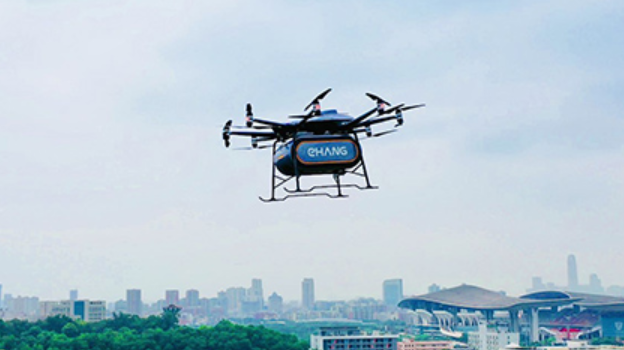
China’s EHang has unveiled a dedicated unmanned logistics version of its 216 electric vertical-takeoff-and-landing (eVTOL) autonomous air taxi.
The move echoes rival eVTOL developer Volocopter’s launch of the VoloDrone heavy-lift cargo version of its multicopter air taxi.
The EHang 216L has a payload of 200 kg (440 lb.), carried in a cargo pod slung between extended landing legs under a propulsion module that has 16 propellers mounted in coaxial pairs on the ends of eight arms. On the two-passenger 216, the same propulsion system is mounted under the cabin.
EHang says the 216L is aimed at short- to medium-haul aerial logistics missions that require frequent point-to-point flights. Examples include transporting agricultural products in mountainous areas with poor roads. Autonomously delivering supplies to offshore oil rigs, replenishing ships in port and providing disaster relief are other potential missions highlighted by the Chinese startup.
Trial logistics operations using the basic 216 eVTOL have already been approved by authorities in China, and EHang is working with customers in Norway on offshore platform deliveries, the Port of Rotterdam in the Netherlands on ship-to-shore transport, and in Canada on organ transport.
Germany’s Volocopter flew the prototype 200-kg-paylaod Volodrone unmanned cargo aircraft, a derivative of its two-seat, 18-rotor Volocopter 2X eVTOL prototype, in October 2019. In February 2020, German logistics service provider DB Schenker invested in the startup’s Series C funding round.
Volocopter and DB Schenker plan to have a commercial logistics trial up and running in 2021, Reuters reported on Sept. 21. Certification of the VoloDrone is expected in 2023, the news agency said, following approval of the production VoloCity two-seat eVTOL air taxi by the end 2022.





